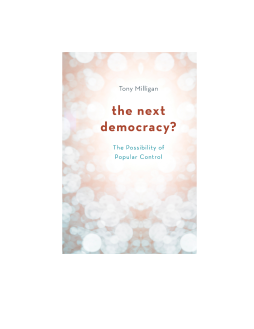
Additional Information
Book Details
Abstract
Representative democracy has long been problematic and subject to erosion through the introduction of components of direct democracy (referenda, voter initiatives and systems of recall). Following the increase of direct action across the world, through the Occupy movement and the rise of new populist parties championing greater citizen inclusion in decision making, many are considering whether the hierarchical system of political control might have had its day. But what might be the alternative, next democracy?
This book considers the viability of a populist conception of democratic organization, which puts power into the hands of ordinary citizens. Examining contemporary and classic theory to contextualize the critique of existing systems, the book goes on to explore alternative arrangements tested out by activists, eco-protestors and anti-capitalists – from the recent Occupy agenda to Gandhi’s experiments in alternative living. Milligan confronts the practical challenges posed by these systems of direct democracy and discusses the considerable difficulties of scaling up and sustaining them in state-level contexts. Whilst the book concedes that such concerns are genuine, it argues that a theory of generalized direct democracy can shake off its utopian aspirations and become a legitimate alternative for the future.
Milligan’s book makes the case that representative democracy as practiced by countries in Europe and North America is broken. He describes “general direct democracy,” a hybrid of representation and direct democracy, as the replacement for the broken system. After outlining the issue in a brief introductory preface, the author explores the reasons why representative democracy has faltered in chapter 1. He outlines how general direct democracy would work in chapter 2. Chapter 3 reviews the Occupy movement of 2011 as an example of faults of representative democracy and the promise of general direct democracy. Chapters 4 and 5 dig into history to detail how the workers’ council of political revolutions was unable to develop workable direct democratic structures. Milligan reviews liberal and republican criticisms of direct democracy in chapter 6 before turning in chapter 7 to the concerns that excess democracy will lead to the deterioration of society. Chapter 8 bears on a historical tangent by examining Gandhi’s panchayat system. The concluding chapter brings the discussion back to the real world of politics. This book will appeal to readers seeking a thorough consideration of a solution to the problems facing modern representative governance. Summing Up: Recommended. Upper-division undergraduates through faculty.
Tony Milligan is Teaching Fellow in Ethics and Philosophy of Religion with the Department of Theology and Religious Studies at King's College London.
In light of emerging populist movements calling for greater direct democracy, Milligan examines alternatives to the hierarchical democratic system. He explores the theoretical and practical challenges of systems of direct democracy, concluding that, despite some obstacles, they could become a legitimate and positive alternative for governance.
Table of Contents
| Section Title | Page | Action | Price |
|---|---|---|---|
| Contents | 9 | ||
| Introduction | 11 | ||
| Chapter One: At the Crossroads | 15 | ||
| Chapter Two: General Direct Democracy | 25 | ||
| Chapter Three: Occupy and Consensus | 45 | ||
| Chapter Four: Weber and the Difficulties of Scaling Up | 65 | ||
| Chapter Five: Arendt and Council Democracy | 85 | ||
| Chapter Six: The Tyranny of the Majority | 103 | ||
| Chapter Seven: The Rule of the Unwise | 119 | ||
| Chapter Eight: Gandhi’s Local Democracy | 133 | ||
| Conclusion | 151 | ||
| Bibliography | 159 | ||
| Index | 163 |
